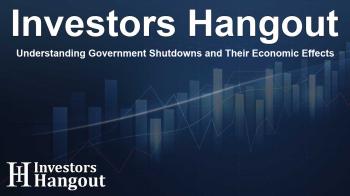Understanding Government Shutdowns and Their Economic Effects

Understanding Government Shutdowns
A government shutdown happens when Congress does not pass a funding bill for federal operations, resulting in non-essential activities being halted. Recent discussions around a potential shutdown have highlighted its significance and the impact it has on various sectors.
What Triggers a Shutdown?
Government shutdowns are triggered when there is a failure to reach a budget agreement. This leads to the suspension of funding for a significant portion of government operations. Programs involved in discretionary spending are the ones that typically face cuts during such events, leaving essential services intact.
The Impact on Federal Employees
During a government shutdown, essential services remain operational while non-essential personnel are furloughed. This means that approximately 2.3 million civilian federal employees and about 1.3 million active-duty military personnel are directly affected. Interestingly, essential employees continue to work but do not receive pay until the shutdown is lifted.
Economic Implications of Government Shutdowns
Historically, the economic repercussions of government shutdowns have been noticeable, albeit modest. For instance, analyses from financial institutions noted that the 2013 and the 2018-2019 shutdowns resulted in a relatively small hit to economic growth, amounting to just a few tenths of a percentage point. While growth generally rebounds post-shutdown, some segments of economic activity may not completely recover.
Consumer Confidence and Investment Delays
Beyond immediate financial impacts, shutdowns can dampen consumer confidence. When public assurance falters, spending often decreases, which can stifle economic growth. Furthermore, important investments may be postponed due to the uncertainty introduced by such fiscal disruptions.
The Ripple Effect on Economic Data
Shutdowns also delay the release of critical economic data, such as employment figures and inflation statistics. For example, after the 16-day shutdown in 2013, there was a two-week delay in releasing the Department of Labor's Employment Situation and Consumer Price Index reports. These delays can complicate economic forecasting and planning.
Policy Implications and Forecasting
Prolonged shutdowns create substantial uncertainty, not just for immediate economic conditions but also for broader policy decisions. Financial institutions have cautioned that disruptions from extended shutdowns, combined with delays in obtaining vital government data, can greatly alter the economic forecast, leading to hesitance in policy formulation.
Final Thoughts
It is clear that the ramifications of a government shutdown extend well beyond the immediate effects on federal operations. The combination of disrupted services, delayed data, and diminished consumer confidence contributes to a complex web of economic implications that can hinder growth and stability. As conversations around funding persist, understanding these dynamics will be essential in navigating future governmental challenges.
Frequently Asked Questions
1. What is a government shutdown?
A government shutdown occurs when Congress fails to pass a funding bill, leading to the suspension of non-essential government operations.
2. Who is affected during a shutdown?
Both civilian federal employees and active-duty military personnel are impacted; some may be furloughed, while essential workers continue without pay.
3. How do government shutdowns affect the economy?
Shutdowns can lead to modest declines in economic growth and delays in crucial economic data, affecting planning and consumer confidence.
4. Why is consumer confidence important during a shutdown?
Consumer confidence influences spending patterns; a dip in confidence may lead consumers to spend less, further affecting economic growth.
5. What are the long-term consequences of a government shutdown?
Extended shutdowns can create uncertainty in economic forecasts, complicate policy decisions, and potentially hinder overall economic recovery.
About The Author
Contact Dominic Sanders privately here. Or send an email with ATTN: Dominic Sanders as the subject to contact@investorshangout.com.
About Investors Hangout
Investors Hangout is a leading online stock forum for financial discussion and learning, offering a wide range of free tools and resources. It draws in traders of all levels, who exchange market knowledge, investigate trading tactics, and keep an eye on industry developments in real time. Featuring financial articles, stock message boards, quotes, charts, company profiles, and live news updates. Through cooperative learning and a wealth of informational resources, it helps users from novices creating their first portfolios to experts honing their techniques. Join Investors Hangout today: https://investorshangout.com/
The content of this article is based on factual, publicly available information and does not represent legal, financial, or investment advice. Investors Hangout does not offer financial advice, and the author is not a licensed financial advisor. Consult a qualified advisor before making any financial or investment decisions based on this article. This article should not be considered advice to purchase, sell, or hold any securities or other investments. If any of the material provided here is inaccurate, please contact us for corrections.

